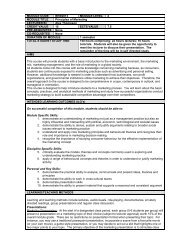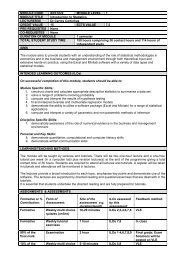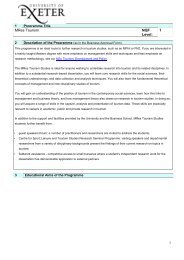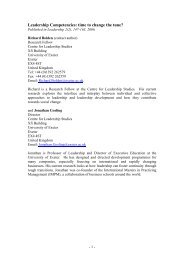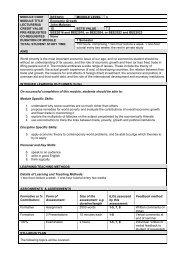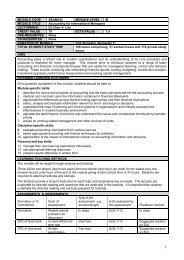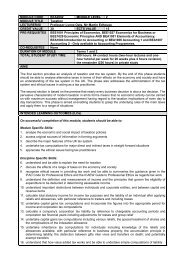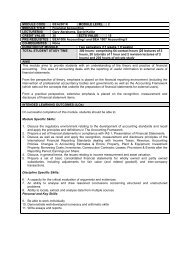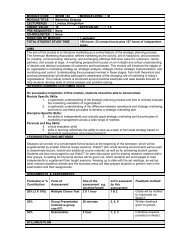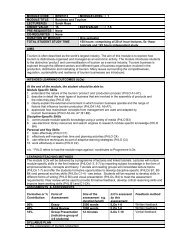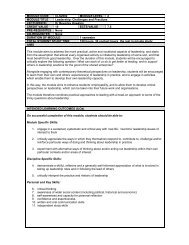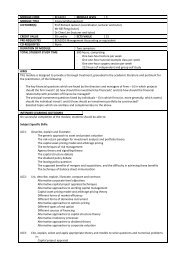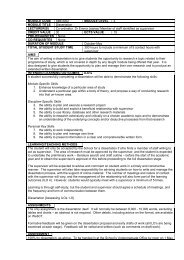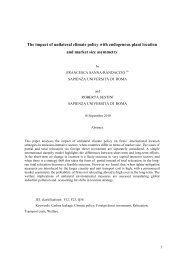What is Leadership? - The Business School - University of Exeter
What is Leadership? - The Business School - University of Exeter
What is Leadership? - The Business School - University of Exeter
Create successful ePaper yourself
Turn your PDF publications into a flip-book with our unique Google optimized e-Paper software.
ignoring that which conflicts. Th<strong>is</strong><br />
situation may be compounded where<br />
other people within the organ<strong>is</strong>ation fail<br />
to challenge the leader’s v<strong>is</strong>ion, either<br />
due to fear <strong>of</strong> repercussions, or overdependence<br />
and trust in the leader’s<br />
judgement.<br />
“Others in the organ<strong>is</strong>ation, who tend<br />
to become dependent on a v<strong>is</strong>ionary<br />
leader, may perpetuate the problem<br />
through their own actions. <strong>The</strong>y may<br />
idealize their leader excessively and<br />
thus ignore negative aspects and<br />
exaggerate the good qualities. As a<br />
result, they may carry out their<br />
leader’s orders unquestioningly – and<br />
leaders may in certain circumstances<br />
encourage such behaviour because <strong>of</strong><br />
their needs to dominate and be<br />
admired” (Conger, 1990, p. 291).<br />
A second way in which leaders can lose<br />
touch with reality <strong>is</strong> as a result <strong>of</strong> their<br />
communication and impressionmanagement<br />
techniques. It <strong>is</strong><br />
undoubtedly true that effective<br />
communication <strong>is</strong> a key leadership skill,<br />
however it <strong>is</strong> also one that <strong>is</strong> open to<br />
abuse. In order to make h<strong>is</strong> or her<br />
v<strong>is</strong>ion more appealing, a leader may be<br />
tempted to d<strong>is</strong>tort the information that<br />
they convey – selectively presenting only<br />
those aspects that enhance their<br />
message. Whilst th<strong>is</strong> may serve to<br />
deceive followers (either intentionally or<br />
unintentionally) there <strong>is</strong> evidence to<br />
indicate that it may ultimately begin to<br />
delude the presenter as well. Th<strong>is</strong> <strong>is</strong><br />
particularly likely where positive<br />
responses are received from the<br />
audience, which reinforce and confirm<br />
the leader’s argument.<br />
<strong>The</strong> third <strong>is</strong>sue presented by Conger that<br />
may undermine a leader’s effectiveness<br />
are management practices that become<br />
liabilities. Whilst unconventional<br />
behaviour may commonly be associated<br />
with char<strong>is</strong>matic and v<strong>is</strong>ionary leaders, it<br />
may well give r<strong>is</strong>e to difficulties in the<br />
organ<strong>is</strong>ation that are hard to overcome.<br />
In particular, problems may ar<strong>is</strong>e with<br />
managing upward and sideways,<br />
relationships with subordinates, a lack <strong>of</strong><br />
attention to admin<strong>is</strong>trative detail and<br />
implementation, and failure to plan for<br />
succession. Thus, the leader’s need for<br />
dominance may sour relationships with<br />
colleagues and subordinates, limit the<br />
development <strong>of</strong> future leaders, and<br />
engender an action-orientated culture<br />
that fails to take sufficient account <strong>of</strong><br />
everyday detail.<br />
Maccoby and Kets de Vries express<br />
similar concerns, but th<strong>is</strong> time they point<br />
to an almost compulsive or pathological<br />
trend within leaders towards narc<strong>is</strong>s<strong>is</strong>m<br />
and an organ<strong>is</strong>ational tendency towards<br />
neuros<strong>is</strong>. Maccoby (2000) argues that<br />
larger-than-life leaders are almost<br />
inevitably driven by a need for<br />
recognition, power and self-promotion<br />
that <strong>is</strong> key to their success, and<br />
occasionally their downfall. Such leaders<br />
tend to express a clear v<strong>is</strong>ion and are<br />
capable <strong>of</strong> inspiring followers through<br />
their char<strong>is</strong>ma and communication<br />
abilities. On the negative side, however,<br />
they are <strong>of</strong>ten sensitive to critic<strong>is</strong>m, shun<br />
emotions, are poor l<strong>is</strong>teners, lack<br />
empathy, have a d<strong>is</strong>taste for mentoring<br />
and development, and are intensely<br />
competitive. Kets de Vries (2004)<br />
echoes these thoughts, as well as those<br />
<strong>of</strong> Gemmill and Oakley by stressing that<br />
leaders and followers are susceptible to<br />
neuros<strong>is</strong> at both an individual and<br />
collective level. <strong>The</strong> blind desire <strong>of</strong><br />
followers to be lead can be just as<br />
harmful as the blind ambition <strong>of</strong> the<br />
leader.<br />
So what can organ<strong>is</strong>ations do to<br />
eliminate or minim<strong>is</strong>e these r<strong>is</strong>ks?<br />
Firstly it <strong>is</strong> important to be aware that<br />
such processes may be occurring – the<br />
very fact <strong>of</strong> making them conscious and<br />
explicit can alert people to the fact that<br />
something may be astray. Secondly,<br />
checks and controls can be put in place<br />
to minim<strong>is</strong>e the potential negative<br />
impact <strong>of</strong> narc<strong>is</strong>s<strong>is</strong>m. Maccoby proposes<br />
a number <strong>of</strong> solutions including finding a<br />
trusted sidekick who can challenge the<br />
leader’s assumptions and encourage<br />
them to consider alternatives;<br />
indoctrinate the organ<strong>is</strong>ation to<br />
internal<strong>is</strong>e the v<strong>is</strong>ion and values <strong>of</strong> the<br />
leader; and get into psychoanalys<strong>is</strong>,<br />
because through self-awareness and<br />
reflection narc<strong>is</strong>s<strong>is</strong>tic leaders will be<br />
better placed to exploit the positive<br />
aspects <strong>of</strong> their personality and minim<strong>is</strong>e<br />
the negative impacts. And thirdly,<br />
organ<strong>is</strong>ations can reconsider the<br />
26 www.leadershipsouthwest.com



